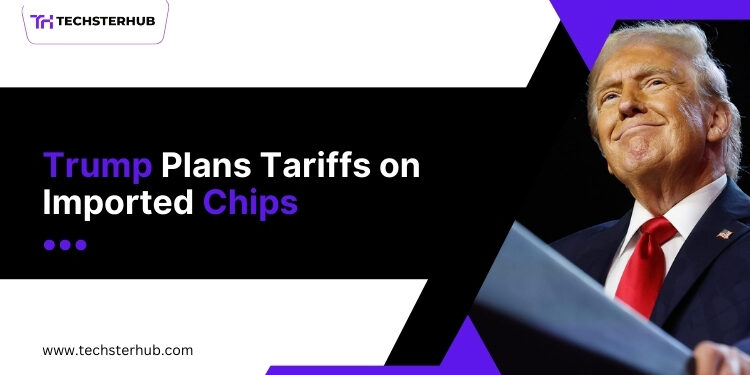Donald Trump declared his future plan to enact tariffs on semiconductor chips imported into the U.S. Trump’s planned tariffs against imported chips used in sectors including defence and consumer electronics form part of his wider strategy to lessen dependence on foreign production while boosting American industrial strength. Political and economic circles in the United States are engaged in heated discussions about the proposed tariffs which have drawn commentary from both supporters and detractors.
The article will examine why Trump chose to implement tariffs on imported semiconductor chips as well as the effects on American consumers and businesses alongside potential global semiconductor industry outcomes.
The Semiconductor Crisis and National Security Concerns
Recent years have presented the global semiconductor industry with substantial difficulties. The semiconductor chip shortage continues because of multiple factors such as the COVID-19 pandemic together with supply chain disruptions and geopolitical tensions. A diverse set of products such as smartphones, laptops, electric vehicles, and medical devices depend on semiconductor chips for proper functioning. Semiconductors hold a vital position regarding national security because they find applications in military equipment, telecommunications infrastructure as well as cutting-edge technologies like artificial intelligence and 5G networks.
The United States depends extensively on semiconductor chip imports from Taiwan, South Korea, and China much like many other nations. The supply chain disruptions of the past few years demonstrated how risky the dependence on semiconductor imports really is. The U.S. government remains apprehensive about foreign dependency for vital components given rising tensions with China and other world powers.
The former President Trump expressed worries about the disappearance of the U.S. manufacturing base in essential sectors like technology and defence. The Trump administration started initiatives to boost domestic chip production using the CHIPS Act to fund U.S. semiconductor manufacturing in 2020 but his recent proposal for tariffs on imported chips indicates an intensified effort to strengthen domestic production and decrease foreign reliance.
Trump’s Tariff Proposal: A Step Toward Economic Independence
During his latest address Trump revealed his strategy to apply tariffs to semiconductor chips brought into the country from abroad. The former president did not detail which tariffs would be applied or when they would take effect but stressed that the initiative was essential to safeguard American jobs and secure national technological and economic self-sufficiency.
Trump stated that America must regain control over its semiconductor industry because we can’t depend on China and Taiwan to supply our economy-driving chips anymore.
President Trump described the tariff proposal as a component of his wider plan to boost domestic manufacturing while decreasing America’s dependency on international imports. He thinks imposing chip import tariffs will drive American companies to establish more semiconductor factories in the U.S. which will generate jobs and drive economic expansion.
The Impact on U.S. Consumers and Businesses
The main worry about the suggested tariffs is how they might affect American consumers. Almost all modern electronic devices depend on semiconductor chips which directly influence the pricing of products such as smartphones, computers and cars. Implementing tariffs on imported semiconductor chips would increase production expenses for companies depending on foreign-made semiconductors. The end result of this situation would likely be increased prices for consumers.
Leading companies such as Apple, Intel, and NVIDIA depend on semiconductor chips that they import from foreign suppliers. The manufacturing costs for companies could rise when imported chips become more costly because of tariffs. These manufacturing companies will likely transfer their increased expenses onto consumers which will result in higher prices for products such as iPhones, laptops and graphics cards.
The tariff plan creates worries about possible interruptions to worldwide supply chain operations. The semiconductor industry functions through complex networks where chips are produced in multiple countries and regions around the world. Tariffs on imported chips might interrupt goods movement which would create production delays and lead to supply shortages. The implementation of tariffs could worsen the current worldwide chip shortage which has already negatively impacted industries like automotive manufacturing because companies have had to cut production because of insufficient chip availability.
Potential Benefits of Tariffs on the U.S. Semiconductor Industry
There are multiple reasons why individuals continue to back tariffs on imported semiconductor chips even though these measures could present some disadvantages. Supporters of the tariffs claim semiconductor manufacturing within the United States would increase because of these protective measures. With the increased cost of foreign chips resulting from U.S. government tariffs companies would be encouraged to fund the construction of new semiconductor production facilities in the U.S.
Some progress has been made in the U.S. semiconductor industry because Intel, TSMC, and Samsung have announced new chip factory developments in America but Trump’s tariff proposal could speed up this shift by offering extra financial motivations for companies to choose U.S. production facilities over foreign ones.
The tariffs would not only promote domestic manufacturing but also enhance the United States’ standing in the worldwide semiconductor market. The Taiwanese company TSMC stands as the top global producer of advanced semiconductor chips while China has achieved substantial progress in its semiconductor sector development. The imposition of tariffs on imported chips by the U.S. government would decrease the market share of foreign manufacturers and allow American companies to gain more ground in the worldwide semiconductor market.
Criticism and Concerns Over the Tariff Proposal
Trump’s tariff proposal offers potential benefits but has received substantial criticism from multiple sources. Economists have pointed out that tariffs on imported chips will lead to unexpected outcomes which will raise costs for American businesses and consumers. Critics maintain that tariffs operate as blunt instruments which can break supply chains apart while driving up costs and provoking retaliatory actions from other countries.
The global nature of the semiconductor industry means companies dependent on international suppliers will struggle to adjust if tariffs increase. When U.S. businesses depend on chip supplies from Taiwan and South Korea their procurement costs may rise thus negatively impacting their profit margins and competitive positioning.
The potential escalation of trade tensions between the U.S. and countries like China is another major concern that could result from implementing tariffs. A trade war between the U.S. and China that damages both their economies could occur if China responds by imposing tariffs on U.S. goods.
Conclusion
The tariff proposal from Donald Trump on imported semiconductor chips stands as a key development in discussions about U.S. manufacturing sector dependence on overseas suppliers. The tariffs could help increase domestic chip production and improve national security but they also present risks such as increased consumer costs and possible global supply chain disruptions.
The U.S. government needs to evaluate the long-term implications of its decisions since the semiconductor shortage impacts global industries. The future implementation of Trump’s tariff proposal is still uncertain but the semiconductor industry will remain central in political and economic debates going forward.











